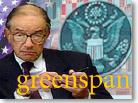|
Fed chief warns of risks
|
 |
February 23, 1999: 1:05 p.m. ET
Greenspan has 'concerns' about stock prices, plans flexible monetary policy
|
WASHINGTON (CNNfn) - Federal Reserve Board Chairman Alan Greenspan expressed concern Tuesday that the eight-year U.S. expansion is at a crossroads, saying the economy "appears stretched in a number of directions."
Among the issues of concern to Greenspan are equity prices, which he called "high enough to raise questions about whether shares are overvalued."
"I have concerns," Greenspan said in testimony before the Senate Banking Committee, responding to a question about his famed "irrational exuberance" comment of late 1996. But he said "whether or not it's (the stock market) gripped by irrational exuberance is something we don't know for sure until after the fact" -- which he interpreted as a major drop in prices over a short period.
Greenspan, in prepared remarks for his semiannual Humphrey Hawkins testimony, said there are "considerable upside and downside risks to the economic outlook," and that "monetary policy must be ready to move in either direction should we perceive imbalances and distortions developing that could undermine the economic expansion."
He also mentioned high consumer and business debt levels and the continuing economic problems in developing nations as areas that he's watching warily.
Greenspan also said that because of the dwindling labor pool, inflation is likely to increase unless productivity "increases significantly further."
GDP growth seen at 2-1/2-3 percent
The Fed chairman said Fed governors and presidents sees gross domestic product growing by about 2-1/2 to 3 percent in 1999, below 1998's 4 percent rate.
Inflation is seen rising at about 2 to 2-1/2 percent, slightly above the 1998 level but "in the vicinity of core CPI inflation over the last couple of years."
In fact, Greenspan said, the economy has been less prone to inflation than in the past. "The chances of an inflationary breakout arguably are, at least for now, less than they would have been under similar conditions in earlier cycles."
A lot of the credit for keeping inflation under control is given by the Fed chairman to employers. "In the current economic setting, businesses sense that they have lost pricing power and generally have been unwilling to raise wages any faster than they can support at current price levels," he said. "Firms have evidently concluded that if they try to increase their prices, their competitors will not follow, and they will lose market share and profits."
Urges banking reform legislation
In a separate section of his testimony, Greenspan urged Congress to approve legislation allowing banks to combine banking, insurance and securities activities in one holding company, rather than forcing them into creating elaborate structures that get around existing laws.
Greenspan said the laws are obsolete, and are costly to financial services companies because they need to spend resources on getting around existing laws and not providing services.
"The markets are demanding that we change outdated statutory limitations that stand in the way of more efficiently and effectively delivering financial services to the public," Greenspan said. "The Federal Reserve agrees and urges prompt enactment of financial modernization legislation."
Brazil, taxes, Y2K
On other issues:
- Brazil is "acutely aware" of the economic problems it faces, and has able people working to resolve it, Greenspan said. "At the end of the day, we're going to find that Brazil has a very formidable economy, just as it has in the past."
- Having larger geographic areas that base their economies on the dollar "would clearly have a stabilizing effect on the currency," the Fed chairman said. But he added that there are downsides, including reliance of the U.S. as a central banker. "Our monetary policy is first, always for the U.S.," Greenspan said. "We cannot be a central bank for others."
- Greenspan again supported doing nothing with the current budget surpluses, saying that allowing them to "run" would do more to resolve pending problems with the Social Security trust fund.
- The chairman backed a cut in marginal tax rates, but said reducing the national debt would have the same impact on national savings.
- On Y2K issues, Greenspan said he's more confident than he was six months ago that the banking system will be little disrupted. In fact, his biggest concern is that people are going to be carrying too much cash around on New Year's Day. "Walking around with a lot of $100 bills is not the safest way to carry money," he said, smiling. "There's some people who are going to be interested in that."
Greenspan, in response to a question from Sen. Paul Sarbanes, D-Md., said he hoped the Humphrey Hawkins testimony would continue on a regular basis. The semiannual testimony is scheduled to be phased out under legislation passed in 1995.
"We think that coming up on a regular scheduled basis ... has been very productive," Greenspan said. "It requires us ... to have a structure of policy that is coherent to the Congress."
"We think it is essential to come up on a periodic basis and explain what it is we're doing," he added. 
|
|
|
|
|
 |

|

